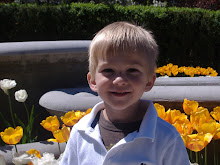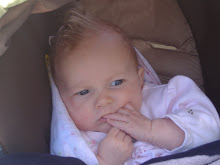To us "dis, dis" is meaningless. "Use words" we plead. "Talk to us, Henry." "Don't say 'dis.'"
And then, today, it suddenly hit me. I knew what "dis" meant. To demonstrate how I arrived at this epiphany, let me share a typical "conversation" between Henry and us, his parents.
Henry: Dis, dis.
Us: Do you want this? (picking up a package of crackers). Do you want this? (picking up his blanket). Do you want this? (picking up a book).
Henry: Dis, dis.
Us (frantic): Don't say dis. What do you want? Use words! Do you want this? (frantically pick up whatever remaining item is within arm's reach). Do you want this? (repeated again, exasperatedly).
Henry (pointing): Dis.
Sometimes it's instructive to shut-up and listen to yourself talk. Instead of pleading with Henry to "use words", I should have been using words. Words like blanket, crackers, book. How can I expect him to distinguish among these items when I use the same word to describe them all?
I recently listened to an episode of This American Life where a father, suspecting his son is doing drugs, decides to tap the phone. The father records dozens of his son's phone calls, which confirm his suspicions to be true. When the son discovers his father has learned of his drug use, he fears the punishment. He is surprised when all his father requires of him is to listen to all of the taped phone conversations. And, oddly enough, that's all it takes to change the son's behaviour. He said that listening to himself on the recorded conversations made him embarrassed - he hadn't realized how stupid he was being - and he changed.
Conventional wisdom says that the key to being a good conversationalist is to be a good listener. We usually assume that this means listening to the other person involved in the conversation. We seldom think about listening to ourselves, to what we are saying and how we are saying it. It's not such a bad idea to stop talking and listen to what you're saying. You may find you have something to teach yourself.








